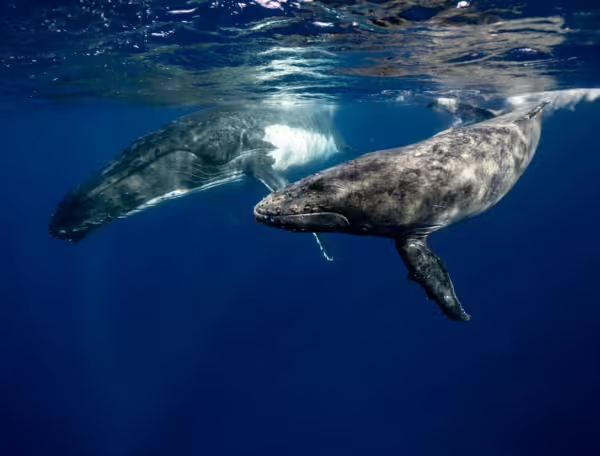Imagining a World Without Whales: The Ecological and Cultural Impact

- Greenland’s New Accessibility: Opening Nuuk Airport to U.S. Travelers
- November 3: Significant Historical Events
- All Souls’ Day: A Journey Through History, Belief, and Cultural Tradition
- November 2: Significant Moments in History
- November 1: A Day of Reflection, Celebration, and Historical Significance
Imagining a World Without Whales: The Ecological and Cultural Impact
Without its largest and most magnificent residents, whales, the vast oceans would feel unimaginably different. In addition to being iconic, these magnificent beasts—the biggest mammals in history—are essential to the wellbeing of marine ecosystems, the global carbon cycle, and the cultures of many coastal communities throughout the world. What would occur, though, if these titans vanished from our planet? The response indicates significant ramifications that would impact human economics, spiritual traditions, oceanic food networks, and global carbon levels.

This article explores the ramifications of a world without whales, examining how ecosystems would change, atmospheric equilibrium would be upset, and a key component of human civilization would be lost.
Ecological Impact: A Keystone Species Gone
Since whales are referred to as “keystone species”, their existence preserves the ecological equilibrium of many maritime habitats. Ocean food systems would be permanently upset if they disappeared.
Whale Falls: The Undersea “Oasis”
Whales’ enormous bodies descend to the ocean floor after they die, forming “whale falls”. More than 100 species depend on the nutrients these carcasses discharge to maintain a distinct ecosystem at the seafloor. As scavengers like hagfish, crabs, and deep-sea worms eat the remnants of decomposing whales, biodiversity flourishes. This population would disappear without whale falls, removing one of the most significant nutrition sources in the deep water.
Predatory species, such as some shark species, which prey on the organisms that live in whale falls, would also increase if whale falls disappeared. A decrease in smaller species might result from such a change, lowering biodiversity and undermining the resilience of the food chain.
Balance of the Food Web
By controlling the numbers of lesser marine species, such as fish and krill, whales preserve ocean biodiversity by preventing any one species from taking over. To keep their numbers under control, large baleen whales, like the blue whale, can eat up to four tons of krill per day. Krill populations may rise if these whale populations vanished, but the ecology might not gain from this. Fish that also depend on these tiny crustaceans for sustenance would be impacted by krill overpopulation, which might lead to the collapse of other species that depend on a healthy food chain.
The Climate Connection: Carbon Sequestration and the “Whale Pump”
Because they trap and store carbon that might otherwise contribute to climate change, whales play a critical role in the global carbon cycle. Their “whale pump” effect and the storage of carbon in their bodies are the two main mechanisms that underpin this function.
The Whale Pump Effect
Whales deliver nutrient-rich materials to the surface waters when they surface after diving to eat in deeper areas. Because their feces is rich in iron and nitrogen, it fertilizes the higher ocean layers, which encourages phytoplankton development. In the marine food chain, these microscopic creatures are the main producers, but they also play a crucial role in photosynthesis, which allows phytoplankton to absorb carbon dioxide.
According to studies, the increase of phytoplankton caused by whales helps absorb tens of millions of tons of CO₂ annually. Reduced phytoplankton would lessen this carbon sink, increasing the amount of CO₂ that may stay in the atmosphere and hastening climate change. In addition to upsetting global weather patterns and affecting food security and ecosystems globally, this cascade effect would exacerbate global warming.
Carbon Burial Through Whale Carcasses
Whales’ enormous bodies sink when they die, releasing the carbon that has been stored in their tissues into the deep water, where it is trapped for decades. This natural carbon burial process would stop if whales were extinct. An estimated 33 tons of CO₂ may be sequestered by each great whale over its lifespan, according to study. A tree, on the other hand, only absorbs a little portion of this total. One of the most effective carbon storage systems on Earth would be lost if whales were eradicated.
Economic Ramifications: Tourism, Fisheries, and Local Economies
Additionally, whales have substantial economic worth, especially in the tourist and fishing industries. Without these creatures to attract tourists, coastal towns that depend on whale viewing would suffer greatly.
Whale-Watching Tourism
Over $2 billion is made by the whale-watching industry worldwide each year, which helps local enterprises and coastal economies in places like Australia, Iceland, and the Pacific Northwest. Boat operators and guides are among the hundreds of employment created by whale watching. Since people go to witness these amazing creatures as well as to experience the biodiversity and natural beauty they symbolize, these economies would suffer if whales disappeared.
Fisheries and Marine Resources
Whales indirectly promote sustainable fisheries by controlling krill and small fish populations. In the absence of whales, krill populations may increase, affecting fish species like salmon and cod that are important to human diets. Food security and the lives of individuals who work in the fishing business would be impacted by this imbalance, which would put stress on fisheries.
Cultural Loss: Whales as Symbols, Myths, and Guardians
Whales have profound cultural significance in addition to their ecological and economic value. For millennia, whales have been respected by indigenous groups such as the Makah, Māori, and Inupiat as representations of power, knowledge, and a connection to nature. Whale-related myths and religious rituals highlight the importance of these creatures to human cultures.
Whales are considered ancestral protectors by the Māori people of New Zealand. In the Pacific Northwest, the Makah Tribe views whaling as a holy ritual that connects them to the natural world and their ancestors. For many communities, the loss of whales would erase an essential component of identity, history, and spiritual life, cutting off these cultural linkages.
Scientific Knowledge and Inspiration
Human knowledge of biology, marine science, and mammalian adaption has also advanced thanks in large part to whales. Their capacity for echolocation has sparked technical advancements, and research into their habits has provided fresh perspectives on marine animal social systems. These technical and scientific advancements as well as a diminished comprehension of the richness of our globe would be lost if whales disappeared.
For ages, poets, authors, and painters have drawn inspiration from whales. They embody the grandeur of nature and stand for the unknown. Their departure would weaken humanity’s connection to the ocean’s immensity and its mysteries by creating a gap in literature, art, and music.
A Call to Action: Preserving Our Planet’s Giants
The idea of a world devoid of whales serves as a sobering reminder of just how intertwined all life is on Earth. The intricacy of marine ecosystems and the equilibrium that supports life on Earth are demonstrated by whales. They must be preserved for the sake of human cultural legacy, economic stability, and efforts to fight climate change, in addition to the health of the seas.
The survival of whale populations depends on conservation efforts. Whale survival is directly supported by initiatives to lessen ship hits, minimize plastic pollution, and fight climate change. Furthermore, encouraging global accords to safeguard marine environments can guarantee that the ecological and financial benefits of whales will be enjoyed by future generations.
Ultimately, realizing the importance of whales goes beyond simply admiring their beauty; it also involves acknowledging our collective duty to maintain the equilibrium of life on Earth. More than merely marine life, whales play a vital role in maintaining the health of our planet and serve as a link between the natural world and humans in many respects.
You also may like: newstimzone.com/blog



















